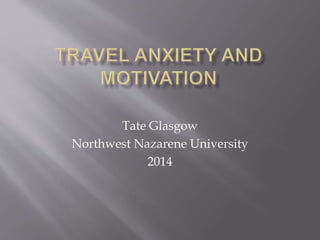Report
Share

Recommended
Recommended
More Related Content
Viewers also liked
Viewers also liked (13)
Managerial implications - sociology and psychology in leisure tourism

Managerial implications - sociology and psychology in leisure tourism
Similar to research presentation
Similar to research presentation (20)
Positive Multiculturalism as Aspirational Ethical Practice: Concepts and Appl...

Positive Multiculturalism as Aspirational Ethical Practice: Concepts and Appl...
Self Esteem, Social Support, Personality Traits as Predictors of Hope: Millen...

Self Esteem, Social Support, Personality Traits as Predictors of Hope: Millen...
A Price To Pay Turkish And Northern American Retaliation For Threats To Pers...

A Price To Pay Turkish And Northern American Retaliation For Threats To Pers...
Outline Format For Argumentative Essay. Argumentative essay outline format. ...

Outline Format For Argumentative Essay. Argumentative essay outline format. ...
Discussion 1 Challenges to Cross-Cultural ResearchChallenge.docx

Discussion 1 Challenges to Cross-Cultural ResearchChallenge.docx
Dr. W.A. Kritsonis, National FORUM Journals, www.nationalforum.com

Dr. W.A. Kritsonis, National FORUM Journals, www.nationalforum.com
Approach - Avoidance Emotions - Ispp 2016 presentation

Approach - Avoidance Emotions - Ispp 2016 presentation
Reaction to Non-Cognitive ability, College Learning.docx

Reaction to Non-Cognitive ability, College Learning.docx
Dr. Darrell Cleveland, The Richmond Stockton College of New Jersey - Publishe...

Dr. Darrell Cleveland, The Richmond Stockton College of New Jersey - Publishe...
O’Connor, N. Stafford, M.R. & Gallagher, G. (2009): A study of tourist tr...

O’Connor, N. Stafford, M.R. & Gallagher, G. (2009): A study of tourist tr...
research presentation
- 1. Tate Glasgow Northwest Nazarene University 2014
- 3. Motivation is the interaction between motive and situation and is cognitive in nature. (0) When people try and satisfy a want it becomes a motivational action. (1) Motivation to travel arises from inability to satisfy a need or a want at home. (1.1)
- 4. 1. Describes forces that pushed people to make a travel decision by internal forces and examines how they are pulled by the external forces. 2. Most commonly used theory in tourist motivation research. (2)
- 5. Push Factors (internal motivations) • Ex: Escape, Novelty, Prestige, enhancement of kinship relationships, and relaxation/ hobbies Explain the desire to go on a vacation. (3)
- 6. Pull factors (extrinsic motivations) • Ex: budget, culture and history, wilderness, ease of travel, cosmopolitan, environment, facilities, and hunting. Pull Motivations have been thought useful for explaining the choice of destination. (4)
- 7. Gender is a major influence on travel demand. Men are much more interested in social activity than females. Men travel more for business, while women travel more leisure purposes. (5)
- 8. Women are motivated by culture, opportunities for family bonding and prestige. (Push) Men place more importance on sports and adventure when engaging in travel experience (6)(Pull)
- 9. 1. Physiological (hunger, thirst, rest & activity) 2. Safety (security, freedom of fear, anxiety) 3. Belonging (love and affection giving/receiving) 4. Esteem (self-esteem, esteem for others) 5. Self-actualization (personal self-fulfillment)
- 10. Anxiety is the bodies attempt to handle a perceived threat (8) 28% of Americans are estimated to experience anxiety disorders in their lifetime. (7) 29,015,463 overseas trips across borders (YTD, 2013)
- 11. Anxiety disorders are more common in females (9). Prior research has looked at anxiety as an intrinsic factor not extrinsic.
- 12. H1:The anxiety level and motivation to travel abroad are inversely related in American travelers H2: Gender directly influences decision making and travel anxiety when deciding to travel internationally RQ: What instigates travel anxiety in American tourists travelling internationally?
- 13. N=30 Male n=12 Female n=18 Between the ages of 18 and 24 Had to have travelled abroad or were planning to within one year.
- 14. Push and Pull Motivation Scale (10) - Three variable categories, novelty knowledge seeking, ego enhancement, and rest and relaxation. - (Disagree) to (Strongly Agree) DASS21 Scale - Five point scale - Gaged anxiety, stress, and depression levels of participants
- 15. Pearson R Correlation Test - Independent Variable (motivation) - Dependent Variable (anxiety) - P<.05 level One-way ANOVA - Gender - Motivation/Travel Anxiety
- 16. Novelty and knowledge seeking - Correlation level of -.142 - Significance (sig.) level of .453 (p< .05) Ego enhancement - Correlation level of .126 - Sig. level of .506 (p<.05) Rest and relaxation - Correlation level of -.193 - Sig. level of .307 (p<.05) H1: Rejected
- 17. Novelty and knowledge seeking - Female m= 4.5414, Male m=4.2742 Ego enhancement - Female m=4.1737, Male m=3.8958 Rest and Relaxation - Female m= 4.2361, Male m=3.8958 No significance was found between gender and motivation to travel abroad (p<.05).
- 18. Gender and Travel Anxiety - Sig. level of .734 (p<.05) No significance in the relationship between gender and travel anxiety H2: Rejected
- 19. Travel was for mission work only Age group between the age of 18-24 from small liberal arts university in Idaho Number of participants Countries in which the participant travelled to Cultural differences Previous travel experience
- 20. Anxiety not a motivational factor Anxiety and decision making Research topics for future studies: - Stress or Depression as IV variable - Cultural heritage and travel motivation - Cultural norms and travel motivation
- 21. 1/0 Huang and Hsu 2.Dann ¾ Plangman 5/6 Meng 7/8 Betanson 9. Mayou 10. Yousefi and Marzuki 1.1 Van Vuuren